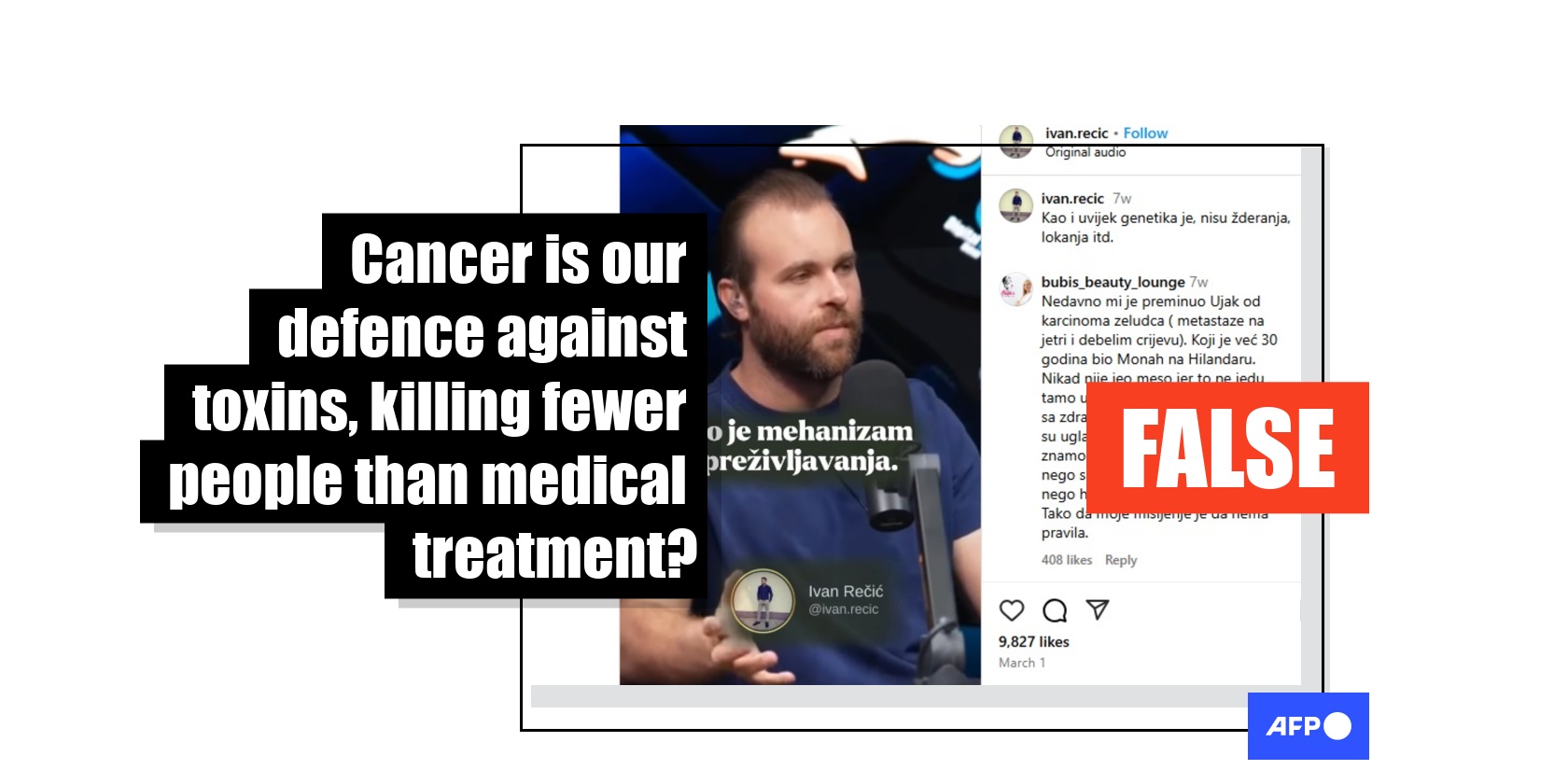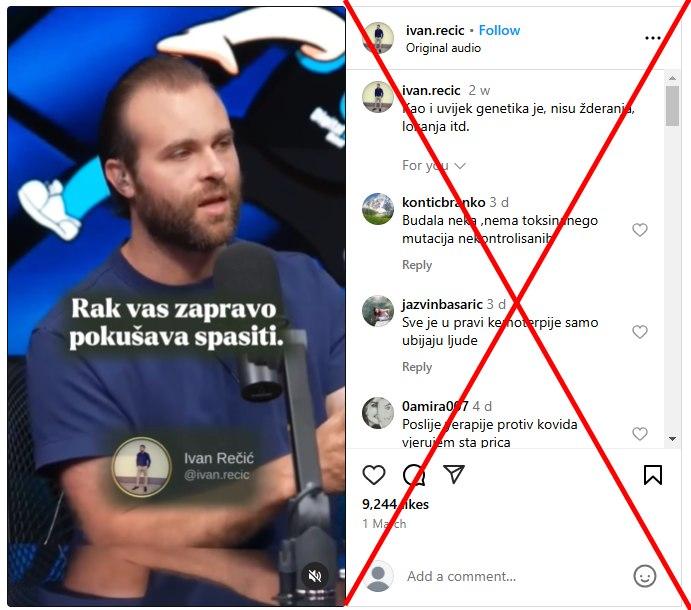
Experts confirm cancer treatment saves lives after US podcast airs baseless pseudoscientific claims
- Published on April 24, 2025 at 12:32
- 6 min read
- By Ivan FISCHER, AFP Croatia
"Cancer is not a disease, it's a survival mechanism", claims a man in a video on Instagram on March 1, 2025, posted with Croatian subtitles.
He then claims that a tumor contains toxins an organism absorbs through diet, lifestyle and stress, concluding that "most people don't actually die from cancer, they die from the treatment of cancer."
The Instagram video quickly gained traction online, garnering more than 9000 likes, with many comments praising the influencer. "He is right about everything chemotherapies only kill people", said one of the commenters. "Bravo, exactly like that", said another. "Treatment is worse than anything", said another.
However, an abundance of scientific evidence shows that cancer is a deadly disease and experts told AFP that the vast majority of patients benefit from cancer treatments.
Official figures show cancer is the second leading cause of death in Croatia.

Using a reverse image search, AFP found that the clip originated from a January 2024 episode of the US-based podcast Digital Social Hour by Sean Kelly. According to the episode's synopsis, the video features "mentalist Joshua Earp", who "dives deep into the intersection of ancient wisdom and modern marketing".
Earp markets himself as an "international celebrity magician and mentalist", and as "a world-renowned entrepreneur, investor, musician, search engine optimization specialist and actor". There is no evidence that he is an expert in medicine or biology.
Cancer is not a 'defensive mechanism'
Cancer is a group of diseases that can start in almost any organ or tissue of the body when abnormal cells grow uncontrollably and is the second leading cause of death globally, with an estimated 9.6 million deaths in 2018 (archived here).
It is the second leading cause of death in Croatia, killing 13,419 people in 2023 (archived here), reflecting 26.17 per cent of all deaths in Croatia that year.
Mortality from cancer is the second highest of all countries in the EU, according to the 2025 OECD and European Commission report on cancer (archived here). While the report estimates medical coverage is sufficient for the country's needs, it notes Croats are in the bottom third of the EU in five out of nine major cancer risk factors -- smoking, obesity, low physical activity, occupational exposure and air pollution.
"Cancer is definitely not a body's defensive mechanism", said oncologist Davor Kust, head of Croatia's Anova clinic and founder of the onkologija.net oncology network, on March 19, 2025. "If it were, there's the question as to why the patient would die?"
Croatian biomedical expert Vanda Juranic Lisnic at Rijeka University's School of Medicine said: "Cancer is the price multicellular organisms pay for their multicellularity. Like in society, our body's cells have to cooperate with others and sometimes make a sacrifice for the greater good. A cancer is a population of cells that no longer cooperates for the good of the organism, but instead divides uncontrollably, even when there's no need for it, even when it leads to their death (because it grew so much it cannot get enough oxygen/food, or because the tumor killed the host)."
"Claims that tumors gather toxins from the body are completely misguided", stressed Juranic Lisnic. "Our body has several organs specifically designed to eliminate toxins, and it certainly doesn't need a tumor to do that."
Later in the clip, Earp also misleadingly claims that all doctors treating cancer patients will first conduct a biopsy -- extracting a small sample of a tumorous tissue to examine it under a microscope -- which he believes the patients do not need (archived here). "Whether your tumour is "cancerous" or not, your path to treatment is still the same", he says.
A tumour is a fast-growing group of cells, but not all of them are the same, as some are not life-threatening (archived here). Depending on the type of tumour, patients can be treated with surgery, chemotherapy, or radiation therapy.
Benign tumours do not always require treatment (archived here). Oncologists decide on a case-by-case basis whether a biopsy is necessary depending on the severity of the disease.
Treatments improve chances of survival
"There are many patients who do not receive treatment, and they do not end up ok," Kust told AFP. "Everything we do is based on scientific facts." According to Kust, people should receive cancer treatments "because we know their results are better". "No one gets cured without treatment - I have never seen that happen. If the disease is not curable, then those patients [receiving treatment] live longer and better."
Kust also noted that chemotherapy, a powerful medication used to kill cancer cells, has a bad reputation due to unpleasant side-effects, but that this is because patients prescribed chemo usually already have a more serious form of the disease (archived here). He noted that a small number of patients can develop serious side effects from therapy, which can lead to death, but that this does not happen often. "If we look at a large number of patients, then the largest number of them benefit from the therapy," he said.
Kust went on to say that, while chemotherapy itself did not advance that much in the past decade or so, there were significant advances in medicines given alongside therapy to mitigate side effects, such as pain or nausea. "Side effects are much milder, and the patients have a much better quality of life today than they did in the past", he said.
Speaking to AFP in December 2024, Kust said that cancer treatments, including chemotherapy, are based on serious scientific research. "All oncology therapies have been through rather strict and uniformed clinical studies, which produce objective and real data, which can be trusted", he said.
"Treating cancer is difficult because you're fighting your own cells, so it's hard to develop a therapy that targets only the tumor cells and not the healthy ones", Juranic Lisnic told AFP. "However, the claim that most people die from cancer treatment rather than the disease itself is unfounded and easily disproven."
"I went through treatment for Hodgkin's lymphoma more than 15 years ago", said Juranic Lisnic, referring to a type of cancer that affects white blood cells (archived here). "Just a few decades ago, people would die from this type of lymphoma, while today it is among highly curable cancers."
An abundance of scientific evidence shows that treatment significantly increases survival rates. For instance, a 2022 study looking at head and neck cancer found untreated patients in the study had a median survival time of 12 months, compared to 100 months for treated patients (archived here).
A 2021 study on endometrial cancer found patients older than 40 have significantly higher survival rates after undergoing surgery, compared to those who refused treatment (archived here).
A 2021 study on metastatic breast cancer also found untreated patients had a median overall survival time of 2.5 months, compared to 36.4 months in treated patients.
Over the long term, improvements in early screening and treatments have seen the cancer death rates decline 33 per cent since 1991 in the US (archived here).
Likewise, in the UK, the proportion of people surviving at least 10 years after their diagnosis passed 50 per cent in 2018, compared to about 24 per cent in the early 1970s (archived here).
A 2025 report from the Swedish Institute for Health Economics (IHE) also showed significant improvements in cancer survival rates between 2000 and 2010 in EU countries for which data from national cancer registers was available (archived here).
AFP has previously debunked claims that forms of cancer screening or treatment can worsen the disease, for example in this article which debunked the claim that mammography causes more harm than good to women, or this article which debunked the claim that cancer is caused by acidic diet and that chemotherapy does not cure the disease.
Copyright © AFP 2017-2026. Any commercial use of this content requires a subscription. Click here to find out more.
Is there content that you would like AFP to fact-check? Get in touch.
Contact us
